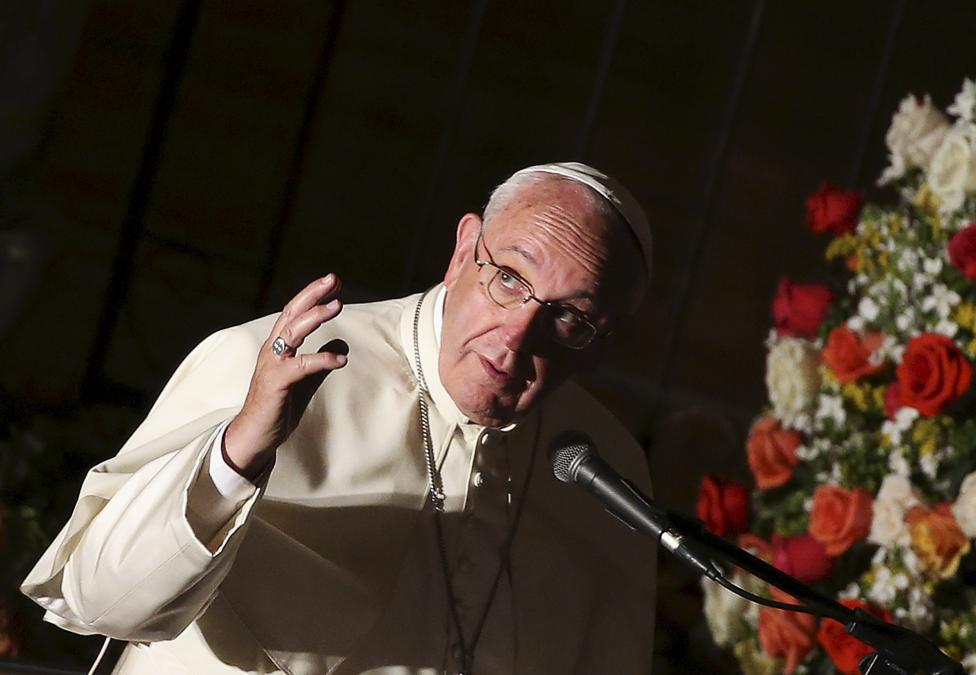Pope Francis speaks during a meeting with members of civil society at the San Francisco Church in Quito, Ecuador, July 7, 2015. REUTERS/Alessandro Bianchi
BY FRANCIS ANEKWE OBORJI
Among many Biblical affirmations about the existence of hell fire, it suffices to cite the following from the Gospel of Matthew:
“You have heard how it was said to our ancestors, ‘You shall not kill; and if anyone does kill he must answer for it before the court. But I say this to you, anyone who is angry with a brother will answer for it before the court; anyone who calls a brother “Fool” will answer for it before the Sanhehrin; and anyone who calls him a
“Traitor” will answer for it in HELL FIRE.” (Matthew 5:21-22).
This article is inspired by the recent fuss in some international and local news media about the “existence or non-existence of hell.” The news reports negating the existence of hell originated from an article written by a 94-year-old Italian journalist and atheist, Eugenio Scalfari, founder and proprietor of Italy’s left-wing daily _La Repubblica_. The purported interview, Mr. Scalfari claimed he had with Pope Francis in the Vatican, was the subject of that article of his published in his newspaper_ La Repubblica._ Till date, _La Repubblica_ remains the major source and origin of the alleged interview and the controversy thereof.
Funny enough, news reports on this alleged interview and negation of hell existence, filled the air during the Holy Week, when Christians all over the world were commemorating the passion, crucifixion, death and resurrection of Jesus Christ, the savior of the world. The news was a big distraction to many of our Christians during the Holy Week and Easter. A good number of our Christians, indeed, have confessed, the news put them off and wondering what was beginning to happen to the church in our era. However, lets’ hope, nobody has lost his faith because of this embarrassing news fuss about the existence or non-existence of hell.
Advertisement
Negating any of the Four Last Things, namely, Death, Last Judgement, Heaven and Hell, for a Christian, equals denying the existence of God, and the divinity of Jesus Christ. It is like making mockery of the whole preparation Christians were making for the annual celebration of the Paschal mystery at Easter. Therefore, sensible Christians have every right to be worried about what circulated in the news media during the Holy Week, concerning the “existence” or “non-existence of hell.”
Reading through, all those stuff negating the existence of hell in the Newspapers and other news media outlets during the Holy Week, no doubt, sensible Christians need be worried. Was the Devil at work or no? This is because, the existence of hell is one of the four cardinal points that form the Christian belief in the life-after-death, mentioned above. Again, denying any of these Last Things, equals denying the existence of God, a thesis, which only someone with atheistic tendencies and illusions, an avowed atheist, could entertain.
Thus in this article, our aim is, to critically, examine what Mr. Scalfari had affirmed in his controversial article on the “existence or on-existence of hell.” Thereafter, we shall evaluate it with the Biblical and church’s teachings on the subject of the existence of hell, relating it to other points on the Last Things according to the Christian faith, namely, Last judgement, and the Hope of the New Heaven and the New earth. The overall aim of the article is to demonstrate that there is no way Pope Francis could have uttered any of those words, Mr. Scalfari attributed to him in his controversial article under consideration.
Advertisement
HELL AND THE _LA REPUBBLICA_’S RECONSTRUCTION:
Good enough, Vatican Press Office has issued a statement dissociating the Pope from what Mr. Scalfari had fed the world media and press with on this matter. Greg Burke of the Vatican Press Office warns, “That any dialogue published in the _La Repubblica_, is ‘Author’s own reconstruction.’ Is not faithful.”
The Vatican denies that Pope Francis gave the 94-year-old Eugenio Scalfari, founder of Italy’s _La Repubblica_ newspaper, an interview, noting it was only a private meeting, and that therefore anything published regarding an alleged interview is not reliable nor can be believed to be the Pope’s words.” The Vatican statement as published in the “Zenith”, Vatican online newspaper is as follows:
“Recently, the Holy Father Francis received the founder of the Italy’s daily _La Repubblica_ in a private meeting, on the occasion of Easter, but without granting him an interview… What the author refers to in today’s article is the fruit of his reconstruction, in which the textual words pronounced by the Pope are not quoted … Therefore, no quotation in the said article must be considered as a faithful transcription of the Holy Father’s words.”
Advertisement
Thanks be to God, Vatican explanation has put to rest all the controversy caused by that article of Scalfari, published in his Italy’s daily _La Repubblica_. It is now obvious that Mr. Scalfari invented the interview he alleged to have had with the Pope. Moreover, he invented also the words he alleged Pope used in the said article. For example, in the article, Scalfari wrote:
“Wicked souls will not be punished, those who repent shall obtain God’s forgiveness and will be counted among the souls of those who contemplate God. But those who do not repent and therefore cannot be forgiven, shall disappear in the oblivion. Hell does not exist, only the disappearance of sinful souls exist.” (Eugenio Scalfari, an Italian atheist and founder of Italy’s daily _La Repubblica_).
Again, according to Mr. Scalfari’s reconstruction of his purported interview with the Pope, in his controversial article, he wrote:
“The Creator, that is, God in the highest heavens, has created the entire universe and above all, the energy which is the instrument with which our Lord created the earth, mountains, seas, stars, galaxies and the living creatures, and in the end, the particles, and atoms, and diverse species that divine nature brought into being. Each of these species lasts thousands or perhaps millions of years, but then disappears. The energy has made the universe to explode in such a way that from time to time it modifies.” (Eugenio Scalfari, an Italian atheist and founder of Italy’s daily _La Repubblica_).
Advertisement
What is clear from these words of Eugenio Scalfari, is that the Italian journalist and atheist was relaying his own atheistic beliefs in the non-Existence of God and life-after. He cleverly reconstructed it and said there were words the Pontiff uttered to him in an alleged “interview” at the Vatican, which never was. Mr. Scalfari invented his own words and wanted to pass them on to the world as Pope’s, just to achieve a particular purpose: ‘To propagate the atheistic ideologies which he had allied his life and philosophy with for many years now. And which he had propagated all these years with his Italy’s daily _La Repubblica_.’
However, this is not the first time Mr. Eugenio Scalfari, the founder of _La Repubblica_ had brought this type of embarrassment to the church and Vatican officials would correct him. Already in 2014, the then Director of the Vatican Press Office, Father Federico Lombardi had to intervene to clarify on what Scalfari had written and said that they do not correspond to the exact words of the popes:
Advertisement
“As already in previous analogous circumstance, there is need to note that what Eugenio Scalfari attributes to the Pope, referring between his quoted words, is a fruit of the memory of the expert journalist, and therefore, not the precise transcription of the recorded fact, but the journalist’s reconstruction for his own personal interest, the affirmations attributed to the Holy Father. There was none and there should not be spoken of, in any way at all, of an interview in the habitual sense of the term, reporting on series of questions and answers, which respect fidelity and certainty, the precise thought of the interlocutor.” (Father Federico Lombardi, former head of Vatican Press Office, 2014).
All this implies that Mr. Scalfari is famous for inventing words or interviews that he never had with Popes. The same thing applies to his recent purported interview with Pope Francis, in which he alleged that the Pope “denied the existence of hell.” He knows that this is not true and cannot be true since it is far from reality.
Advertisement
Thus, it has turned out that Scalfari was lying, because Pope Francis never granted him any interview but received him in a private meeting as he did with some others same day in the Vatican. Moreover, Scalfari could not produce any registered record of the interview he claimed he had with the Pope on the theme of “existence or non-existence of hell.”
Therefore, in reality, Pope never uttered those words Scalfari attributed to him in the said article. There was never a time also Pope Francis denied the existence of hell. To hold such a view is like calling the Holy Father an atheist. God forbid! Was this what Scalfari wanted to achieve in that article? No one knows. But it is obvious, the intention of Scalfari in the said article was not clear.
Advertisement
Again, Mr. Scalfari is the founder of Italy’s left-wing daily newspaper _La Repubblica_. _La Repubblica_ published the said article of their founder Scalfari, and from them other world media houses got their source for the news attributed to Pope francis on the existence or non-existence of hell.
In the first place, _La Repubblica_ is generally seen as a left-wing daily, famous in publishing materials that promote atheistic ideological principles and beliefs of their founder, especially, about heaven and earth. The Italian daily is also popular and notoriously known as promoter of anti-social and anti-moral values and behaviors, promoted these days by some of the extreme left-wing movements in the West. Furthermore, the Newspaper publishes materials often viewed by many as anti-Church and anti-Christian principles.
For instance, the Newspaper is the major organ of news outlet of those movements and organizations supporting ‘homosexual marriages’, abortion, women ordination, marriage of Catholic priests, use of contraception, euthanasia, etc. Indeed, most of the anti-social behaviors the church preaches against these days.
So, it is not surprising if the Newspaper carries such a news alleging that the Pope “questions existence of hell.” Both the Newspaper editors and Mr. Scalfari himself knew, the Pope never uttered such words attributed to him in the said article. But the Newspaper published it, knowing that it is a lie, just to remain in business and promote its atheistic ideologies.
Pope Francis started receiving Mr. Scalfari (who is now about 94-years old) and exchanging seasonal greetings with him just about four years ago. This, one would guess, was in a bid to bring him (Scalfari) closer to God, make him see the light and need to leave atheism as that does not offer any hope or future to anybody or humanity but only a philosophical and psychological illusions. Again, from the explanation the Vatican Press Office has offered so far, it is obvious and clear, there was never a time the issue or question of hell or its non-existence came up or was contemplated by the Pope during the brief meeting he granted or had granted in the past to the founder of _La Repubblica_, Mr. Scalfari.
The author of the said article invented the words, which he said were outcome of his interview with the Pope. But as it is now evident, Pope never granted Mr. Scalfari any interview, nor did he discuss with him the question of non-existence of hell.
Since what was alleged was about what Mr. Scalfari said the Pope told him about the existence of hell, our discussion of the topic in this article, definitely, will draw mainly from the Catholic teaching and theology on the subject of hell. Already, the 1992 _Catechism of the Catholic Church_ (CCC), has an excellent presentation of the church’s teaching on the subject on what it believes are the Last Things, which is found in Article 12 of the _CREED_: “I BELIEVE IN LIFE EVERLASTING.”
In brief, CCC (nos. 1020-1064), presents the following as the Last Things at the end of our earthly existence: Death, Heaven, Final Purification, or Purgatory, Hell, Last Judgement and the Hope of the New Heaven and the New Earth.
In fact, recently, Catholic Church, through the Vatican Office of the Congregation for the Doctrine of the Faith, published a new document, entitled, “PLACUIT DEO” – On Some Aspects of Christian Salvation (22 February, 2018). The document aims to correct some emergent tendencies in contemporary thoughts. In particular, those tendencies and ideologies of contemporary thought that appear to be a return to the heresies of the past, that attacked some Christian teachings on the Last Things, in particular, on salavation in Christ.
The “PLACUIT DEO”, mentions in particular, new forms of neo-Pelagian heresy, which, together with neo-Gnosticism are emerging in some strands of contemporary thoughts. The document corrects the individualistic ideologies inherent in most of these new forms of neo-Pelagianism and neo-Gnosticism of our time. These new forms of Pelagianism and Gnosticism, the document warns, tend to deny the Christian teaching on salvation and the Last Things (see “PLACUIT DEO_”_, n. 4).
However, in the present article, our interest is on the following aspects of the Last Things: Hell, Last Judgement, and the New Heaven and the New Earth.
HELL IS REAL
From biblical affirmations and Christian tradition as well as the teachings of the church and Christian faith in general, the existence of hell and its eternity is real. For instance, according to the “Catechism of the Catholic Church” (CCC): “Immediately after death the souls of those who die in a state of mortal sin descend into hell, where they suffer the punishments of hell, ‘eternal fire.” The chief punishment of hell is eternal separation from God, in whom alone man can possess the life and happiness for which he was created and for which he longs. (CCC, n. 1035).
The condition for going to heaven and therefore, avoiding hell, is love of God and neighbor. We cannot be united with God unless we freely choose to love him. But we cannot love God if we sin gravely against him, against our neighbor or against ourselves: “He who does not love remains in death. Anyone who hates his brother is a murderer, and you know that no murderer has eternal life abiding in him.” (1John 3:14-15).
Again, our Lord warns us that we shall be separated from him if we fail to meet the serious needs of the poor and the little ones who are his brethren (Matthew 25:31-46). To die in mortal sin without repenting and accepting God’s merciful love means remaining separated from him forever by our own free choice. This state of definitive self-exclusion from communion with God and the blessed is called “HELL” (CCC, n. 1033).
Furthermore, Jesus often speaks of “_GEHENNA_”, of “the unquenchable fire” reserved for those who to the end of their lives refuse to believe and be converted, where both soul and body can be lost ((Matthew 5:22, 29; 10:28; 13:42, 50; Mark 9:43-48). Jesus solemnly proclaims that he “will send his angels and they will gather…all evil doers, and throw them into the furnace of fire” (Matthew 25:41-42), and that he will pronounce the condemnation: “Depart from me, you cursed, into the eternal fire” (Matthew 25:41).
In all, however, the biblical affirmations and the teachings of the church as well as Christian witness on the subject of hell are A CALL TO THE RESPONSIBILITY incumbent upon man to make use of his freedom in view of his eternal destiny. They are at the same time an urgent call to conversion: “Enter by the narrow gate; for the gate is wide and the way is easy, that leads to destruction, and those who enter by it are many. For the gate is narrow and the way is hard, that leads to life, and those who find it are few” (Matthew 7:13-14).
It is also the church’s teaching that God predestines no one to go to hell; for this is, a willful turning away from God (a mortal sin) is necessary, and persistence in it until the end. In the Eucharistic liturgy and in the church’s prayers for the faithful, the church implores the mercy of God, who does not want “any to perish, but to come to repentance” (1Peter 3:9).
THE LAST JUDGEMENT
The above teachings of the Sacred Scripture and the church on the existence of hell, naturally leads us to the subject of the “Last Judgement.” Here also Christian believe takes its’ bearing from our faith in the resurrection of the death, and therefore, in the life-after. According to our Christian faith, the resurrection of all the dead, ‘of both the just and the unjust’, will precede the Last Judgement (Acts 24:15). This will be “the hour when all who are in the tombs will hear [the Son of man’s] voice and come forth, those who have done good, to the resurrection of life, and those who have done evil, to the resurrection of judgment” (John 5:28-29). Then Christ will come “in his glory, and he will separate them from one another as a shepherd separates the sheep from goats, and he will place the sheep at his right hand, but the goats at the left … And they will go away into eternal punishment, but the righteous into eternal life.”(Matthew 25:31, 32, 46; CCC, n. 1038).
Put in a simple language, what this means in effect, is that in the presence of Christ, who is Truth itself, the truth of each man’s relationship with God will be laid bare (John 12:49). The Last Judgement will reveal even to its furthest consequences the good each person has done or failed to do during his or her earthly life. In the words of St. Augustine:
“All that the wicked do is recorded, and they do not know. When ‘our God comes, he does not keep silence.’ … he will turn towards those at his left hand…. ‘I placed my poor little ones on earth for you. I as their head was seated in heaven at the right of my Father – but on earth my members were suffering, my members on earth were in need. If you gave anything to my members, what you gave would reach their head. Would that you had known that my little ones were in need when I placed them on earth for you and appointed them your stewards to bring your good works into my treasury. But you have placed nothing in their hands; therefore you have found nothing in my presence.” (St. Augustine, _“SERMO”_ 18, 4).
In all, however, the Last Judgement will come when Christ returns in glory. Only the Father knows the day and the hour; only he determines the moment of its coming. Then through his Son Jesus Christ, he will pronounce the final word on all history. We shall know the ultimate meaning of the whole work of creation and of the entire economy of salvation, and understand the marvelous ways by which his Providence led everything towards its final end. The Last Judgement will reveal that God’s justice triumphs over all the injustices committed by his creatures and that God’s love is stronger than death (CCC, n. 1040).
Therefore, like the Christian believe in the existence of hell, the message of the Last Judgement calls men and women to CONVERSION while God is still giving them “the acceptable time, … the day of salvation” (2Corianthians 6:2). It inspires a holy fear of God and commits them to the justice of the Kingdom of God. It proclaims the ‘blessed hope’ of the Lord’s return, when he will come “to be glorified in his saints, and to be marveled at in all who have believed.” (Titus 2:13; 2Thessolians 1:10).
THE HOPE OF THE NEW HEAVEN AND THE NEW EARTH
Finally, the Christian faith teaches us that at the end of time, the Kingdom of God will come in its fullness. After the universal judgement, the righteous will reign forever with Christ, glorified in body and soul. The universe itself will be renewed:
“The church … will receive her perfection only in the glory of heaven, when will come the time of the renewal of all things. At that time, together with the human race, the universe itself, which is so closely related to man and which attains its destiny through him, will be perfectly re-established in Christ” (_Lumen gentium_, n. 48; Acts 3:21; Ephesians 1:10; Colossians 1:20; 2Peter 3:10-13).
The Bible calls this mysterious renewal, which will transform humanity and the world, “new heavens and a new earth” (2Peter 3:13; Revelation 21:1). It will be the definitive realization of God’s plan to bring under a single head, “all things in [Christ], things in heaven and things on earth” (Ephesians 1:10). In this new universe, the heavenly Jerusalem, God will have his dwelling among men (Revelation 21:5). “He will wipe away every tear from their eyes, and death shall be no more, neither shall there be mourning nor crying nor pain any more, for the former things have passed away” (Revelation 21:4).
FOR US HUMAN BEINGS, this consummation will be the final realization of the unity of the human race, which God willed from creation and which the pilgrim church on earth has been “in the nature of sacrament” (_Lumen gentium_, 1). Those who are united with Christ will form the community of the redeemed, “the holy city” of God, “the Bride, the wife of the Lamb” (Revelation 21:2, 9). She will not be wounded any longer by sin, stains, self-love, that destroy or wound the earthly community. (Revelation 21:27). The beatific vision, in which God opens
himself in an inexhaustible way to the elect, will be the ever-flowing well-spring of happiness, peace, and mutual communion.
FOR THE COSMOS, Revelation affirms the profound common destiny of the material world and man:
“For the creation awaits with eager longing for the revealing of the children of God … in hope because the creation itself will be set free from its bondage to decay… We know that the whole creation has been groaning in travail together until now; and not only the creation, but we ourselves, who have the first fruits of the Spirit, groan inwardly as we wait for adoption as sons and daughters, the redemption of our bodies.” (Romans 8:19-23).
In other words, the visible universe, is itself destined to be transformed, “so that the world itself, restored to its original state, facing no further obstacles, should be at the service of the just”, sharing their glorification in the risen Jesus Christ.
As Christian faith in the LAST THINGS, affirms, we know neither the moment of the consummation of the earth and of man, nor the way in which the universe will be transformed. The form of this world, distorted by sin, is passing away, and we are taught that God is preparing a new dwelling and a new earth in which righteousness dwells, in which happiness will fill and surpass all the desires of peace arising in the hearts of men and women. (_Gaudium et Spes_, 39).
This teaching of new heaven and a new earth God is preparing for his elect, far from diminishing our concern to develop this present earth, the expectancy of a new earth itself should spur us on, for it is here, that the body of a new human family grows, foreshadowing in some way the age which is to come. That is why, although we must be careful to distinguish earthly progress clearly from the increase of the Kingdom of Christ, such progress is of vital concern to the Kingdom of God, insofar as it can contribute to the better ordering of human society.
“When we have spread on earth the fruits of our nature and our enterprise… according to the command of the Lord and in his Spirit, we will find them once again, cleansed this time from the stain of sin, illuminated and transfigured, when Christ presents to his Father an eternal and universal Kingdom. God will be “all in all” in eternal life.” (1Corianthians 15:28).
CONCLUSION
From our discussion in this article on the subject of the existence of hell, it is clear that there is no way Pope Francis could have told the Italian journalist Eugenio Scalfari, that, “hell does not exist.” What the author of the said article published in _La Repubblica_, on the subject of hell and its existence or non-existence, said, is nothing else, but his own invention. His, was an effort in futility to use the name and office of the Pope to disseminate, not just left-wing ideas, but this time, the atheistic ideologies and viewpoints on the existence or non-existence of hell.
Furthermore, Mr. Scalfari’s interpretation of hell is more or less, from sociological and psychological viewpoints. At best, he was influenced by the Enlightenment philosophy or the Pelagian and Gnostic heresies of the past and contemporary eras. However, his viewpoints, as we have seen, have no basis in traditional theology, and in contemporary theological discourse on the authentic Christian believe and teaching on the subject of hell.
In contemporary theology, for example, the physical style of interpretation has given way to a more anthropological style. The need to distinguish between symbolic discourse and religious message is seen as basic.
Again, in contemporary theology, the message of hell has to do with the seriousness with which we view human life and with the reality of total failure in working out the project of human life. If the positive outcome of life is a union of love with God, such union presupposes freedom. But freedom in turn involves the possibility of refusing or accepting the gift of God’s self-communication.
Therefore, the very conditions for the reality of the Christian positive fulfilment are simultaneously the reasons why theology affirms the biblical and church’s teachings, that hell is real. The reality of hell cannot be denied without denying human freedom itself. Above all, Christian faith in the existence of hell has a correlation with the affirmation of the reality of heaven as the fulfilment of human history that has been accomplished in Jesus Christ.
Lord help me to remember that nothing is going to happen today that you and I together can’t handle. (Blessed Cyprian Iwene Tansi of Aguleri (Nigeria).
Views expressed by contributors are strictly personal and not of TheCable.






